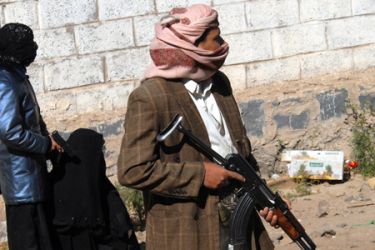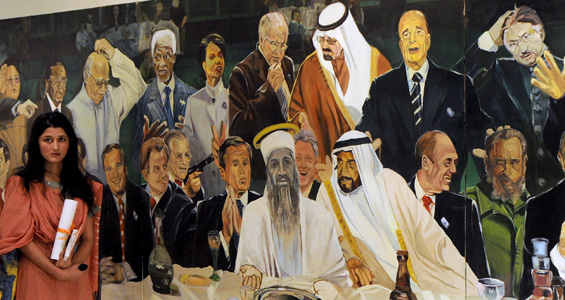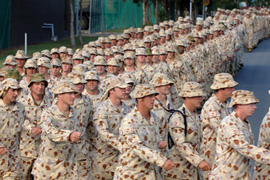Interview: Richard Barrett
UN official responsible for monitoring al-Qaeda discusses the group’s regional offshoots.

 |
| Richard Barrett says Osama bin laden continues to be an ‘inspirational character’ [EPA] |
The failed Christmas Day airliner attack has resuscitated fears of terrorism in the US. But that fear is no longer focused on Afghanistan, where 68,000 US troops are stationed, or on Iraq, with 120,000 US troops. For now the focus has switched to Yemen.
Umar Farouk Abdulmutallab, the Nigerian man accused of trying to blow up the US airliner bound for Detroit, had spent the few months before the attack in Yemen and al-Qaeda in the Arabian Peninsula (AQAP) has claimed responsibility for the attempted attack.
Four months ago, a suicide bomber from the same group, using a similar explosive, nearly killed a top Saudi counterterrorism minister.
Former British intelligence official, Richard Barrett, the UN’s highest ranking official responsible for monitoring the activities of al-Qaeda and the Taliban, tells Al Jazeera, that AQAP is the most dangerous of al-Qaeda’s regional offshoots and that its mission is to destabilise the Kingdom of Saudi Arabia. He recently spoke with Al Jazeera.
Al Jazeera: How strong is AQAP compared with al-Qaeda’s presence in Afghanistan and Pakistan?
Richard Barrett: AQAP has until recently focused on targets in Saudi Arabia and Yemen, and may continue to do so. But the attempt to bring down an aircraft over Detroit on December 25 shows that, where the means exist, AQAP may also launch attacks outside the region.
It remains to be seen whether they have the capacity to do so on a continuing basis.
AQAP, however, is like the other al-Qaeda affiliates in that its main objectives are local.
Al-Qaeda in Iraq is now a marginal group which is as unlikely as it ever was to have any meaningful influence over the political process there. It still appears to be sectarian and backward looking, apparently now working with ex-Baathists.
Al-Qaeda in the Islamic Maghreb has been increasingly pushed to the ungoverned areas of Southern Algeria and Northern Mali and has not managed to get active operational supporters in Europe. Its agenda remains local.
Al-Shabab in Somalia claim allegiance to al-Qaeda, but the al-Qaeda leadership has not recognised this and the fight in Somalia seems to have remained, so far, local and tribal.
The al-Qaeda leadership in the Afghan/Pakistan border area is constrained by military action and is not in a position to plan and mount major attacks.
So my conclusion is that compared to the even weaker state of other parts of al-Qaeda, AQAP is currently probably its strongest part.
You recently said al-Qaeda operatives hiding in Yemen are the most dangerous …
 |
| Saudi oil infrastructure is a key target for AQAP [GALLO/GETTY] |
I do believe they are very dangerous – they are young, they are hotheaded and of course as the Saudi Arabian authorities have being successful in pushing al-Qaeda supporters out of Saudi Arabia, they have tended to go to Yemen and join with Yemenis there who are keen to support their attacks in Saudi Arabia over the border.
And that area there is difficult for the Yemenis to control and the Yemenis of course have a great deal on their hands with the rebellion in the North and the separatist movement in the South, with all the economic and social problems they face in addition.
Has the government of Yemen done enough to combat AQAP? Should the international community have done more to stop the growing threat AQAP poses in Yemen?
The Yemeni authorities have a lot of problems on their plate and it is very difficult to deal with because, of course, they need to have the cooperation of the tribes to deal with it.
But I think the involvement of the international community inside Yemen is a delicate issue that the Yemenis should be fully in control of – so maybe we should have responded more to Yemeni requests for assistance and I see that the US and the European Union have increased their support for Yemen over recent months which suggests perhaps they could have done this earlier.
I am not sure Yemen sees it as such a threat – certainly not as much as the rest of the world does following the December 25 attempt. But I think the international community was very well aware of al-Qaeda in the Arabian Peninsula and the threat it could be posing.
And of course Saudi Arabia in particular was because it was made up of Saudis and their objectives were to attack targets in Saudi Arabia.
Why is Saudi Arabia their main target?
Saudi Arabia is the heartland for al-Qaeda. It has always been a target for them.
I think it is both the Western dependence on Saudi Arabian oil but also the alliance between Saudi Arabia and the West, which is very strong, and I think what the al-Qaeda people see is that if they could attack the economic infrastructure in Saudi Arabia they would be achieving two aims: that is weakening the West but also weakening the authorities in Saudi Arabia which, of course, they don’t support at all.
Do you think al-Qaeda remains a global threat?
Al-Qaeda is still very determined that’s the thing. I think they are very weakened and they have been unable to mount big operations as they would like to but it’s still a threat.
And the leadership in the Afghan-Pakistan border area is still very very keen to link up with people elsewhere in the world who it can persuade and help to mount major attacks.
And what the al-Qaeda leadership would like to do is to establish some sort of control over their operations to make it more strategic rather than these sort of small attacks as they occur at the moment.
Are they succeeding?
I don’t think they are. They remain under a great deal of pressure.
There is this threat that the al-Qaeda leadership could link up with people who can travel easily to other countries to commit attacks. And it’s difficult for authorities to maintain watch over all these people. Although we have been successful in stopping attacks over the last couple of years, major attacks, perhaps also we’ve been lucky.
Which enemy should be the greater priority for the US in Afghanistan: the Taliban or al-Qaeda?
I think for the US they’ve made it clear that al-Qaeda is the greatest enemy and their attacks on the Taliban seem to follow their desire to defeat al-Qaeda. In my opinion I think that’s probably right.
Clearly there’s a great design in the international community to ensure that al-Qaeda doesn’t have any safe havens from which to attack and operate, whether locally or elsewhere.
The question is whether the Taliban would give them these safe havens if they controlled in any sustainable way territory in Afghanistan or even the whole country.
But generally speaking I think that the Afghan Taliban have made it absolutely clear, if we believe them, that they are only interested in the future of Afghanistan and not in disturbing the future of their neighbours or indeed any other country.
Will the inversion of the groups’ traditional power dynamic lead to better or worse relations?
I think that the relations are obviously very well established over many years, we have to accept that. And these people are very used to one another and to a certain extent share some objectives – you know what they think is the right sort of government and what they don’t like in the sense of outside influences.
But essentially as the Taliban come closer, if they do, to some sort of political accommodation with the rest of the Afghan community, then they will find the weight of al-Qaeda around their necks – or the perception that al-Qaeda remains around their necks – a hindrance and this will probably lead to some sort of tensions and I am hoping that certainly that will be true.
And al-Qaeda has made it very clear that their battle is a global one whereas the Taliban have made it clear their battle is a local one.
I think also we’ve seen some differences of opinion because al-Qaeda are very much interested in attacking Pakistani troops and Pakistani targets as are the Pakistan Taliban people they work with.
As for the Afghan Taliban, they have always made it clear that that’s not their objective, that they believe the battle is against foreign forces and the Karzai government in Afghanistan and that it has nothing to do with the Pakistani forces or army.
The Saudi Arabian government maintains that the Taliban would become moderate in due course. Do you agree?
 |
| Is sending more troops to Afghanistan the right move? [EPA] |
I think what the Taliban will become is perhaps more sophisticated and more practiced in government.
I think that when they were running the country before – or large parts of it before – I don’t think they were very sophisticated and I think were still very much in a learning stage and really in a developmental stage and they weren’t quite clear what their policies should be. I hope they learn from that.
The trouble to me is that now for many many years – for over a generation – the Afghan people have known nothing but conflict and it will be very difficult for everybody to settle down in a sort of peaceful, civilian type government.
Is capturing Osama bin Laden the key to defeating al-Qaeda?
I am not sure it’s the key to defeating al-Qaeda, I am not even sure it will make a big difference to al-Qaeda.
Certainly Osama bin laden has remained an inspirational character though I don’t think he has much operational control over what al-Qaeda does.
Whether he was imprisoned, dead, hiding in those remote areas in Pakistan/Afghanistan, I am not sure what difference it will make.
What we have to do is to ensure that the global community understands that what al-Qaeda offers is purely destructive, negative, a hopeless philosophy and if we want progress, security and prosperity then the last people we should be looking to to help us is al-Qaeda.
They offer nothing but further disadvantage.
And it’s making that clear to people that al-Qaeda lack any relevance to life today and they lack any credibility as well I think that’s the main thing – that we shall do whether Osama bin Laden is captured or not.